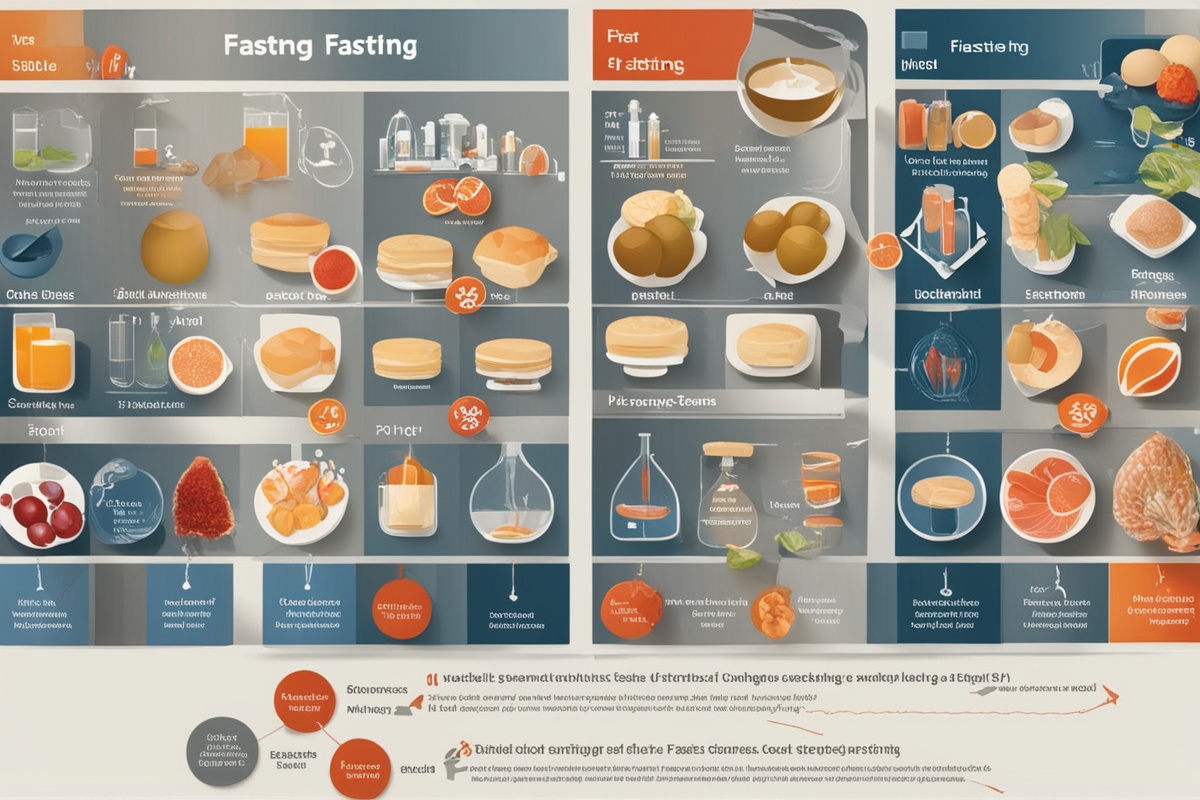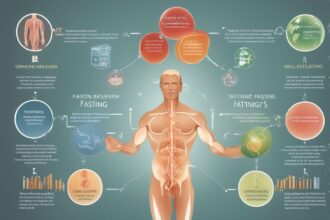Intermittent fasting (IF) has gained immense popularity as a dietary approach for weight loss, improved metabolic health, and even longevity. However, beyond its visible effects on the body, there is growing interest in the deeper, molecular-level changes it induces. One of the most fascinating areas of research is the genetic impacts of intermittent fasting. How does this eating pattern influence our genes, and what does it mean for our long-term health? In this post, we’ll explore the intersection of fasting and genetics, diving into how IF can affect gene expression, cellular repair mechanisms, and even hereditary health risks.
What Are the Genetic Impacts of Intermittent Fasting?
Intermittent fasting refers to cycles of eating and fasting, such as the 16:8 method (fasting for 16 hours and eating within an 8-hour window) or the 5:2 diet (eating normally for five days and restricting calories on two days). While the immediate benefits of IF often include weight loss and improved insulin sensitivity, its genetic impacts are less visible but equally profound. Research suggests that fasting triggers changes in gene expression—the process by which information from a gene is used to create functional products like proteins. These changes can influence everything from metabolism to inflammation and aging.
During fasting, the body shifts into a state of ketosis, where it burns fat for fuel instead of glucose. This metabolic switch activates specific genes associated with stress resistance and cellular repair. For instance, fasting can upregulate genes involved in autophagy, a process where cells recycle damaged components, which is crucial for maintaining cellular health. Understanding these genetic impacts can help us appreciate why IF might do more than just help us shed pounds—it could potentially reshape how our bodies function at a fundamental level.
How Intermittent Fasting Influences Gene Expression
Gene expression is the cornerstone of how our bodies respond to environmental changes, including diet. Intermittent fasting has been shown to influence the expression of genes related to oxidative stress, inflammation, and energy metabolism. For example, fasting can increase the expression of sirtuins, a family of proteins linked to longevity and cellular health. Sirtuins, often called “longevity genes,” play a role in DNA repair and regulating inflammation, both of which are critical for preventing age-related diseases.
Studies also indicate that IF may downregulate genes associated with chronic inflammation, a key driver of conditions like diabetes and heart disease. By modulating these genetic pathways, intermittent fasting could offer protective effects against metabolic disorders. If you’re curious about how diet impacts inflammation, check out our post on Diet and Inflammation: What You Need to Know.
Intermittent Fasting and Epigenetics: Beyond the DNA Sequence
While our DNA sequence remains largely unchanged throughout our lives, epigenetic modifications—chemical changes that affect how genes are read—can be influenced by lifestyle factors like fasting. The genetic impacts of intermittent fasting extend to epigenetics, where fasting may alter DNA methylation patterns or histone modifications. These changes can “turn on” or “turn off” certain genes without altering the underlying genetic code.
For instance, fasting has been linked to epigenetic changes that enhance the expression of genes involved in fat metabolism and insulin sensitivity. This could explain why IF is so effective for managing conditions like type 2 diabetes. Epigenetic modifications induced by fasting might also have implications for disease prevention, as they can influence how cells respond to stress or damage over time. To learn more about epigenetics, read our detailed guide on Epigenetics and Lifestyle Choices.
Can Intermittent Fasting Affect Genetic Predispositions?
One of the most intriguing questions surrounding the genetic impacts of intermittent fasting is whether it can mitigate genetic predispositions to certain diseases. While fasting cannot change your DNA, it may influence how those genes are expressed, potentially reducing the risk of conditions like obesity, diabetes, or even certain cancers. For example, individuals with a family history of metabolic syndrome might benefit from IF due to its ability to improve insulin signaling and reduce inflammation at a genetic level.
However, the extent to which fasting can override genetic predispositions is still under investigation. It’s also worth noting that genetic responses to fasting can vary widely between individuals. Some people may experience significant benefits, while others might not respond as favorably due to their unique genetic makeup. If you’re interested in personalized nutrition based on genetics, explore our article on Genetic Testing for Personalized Diets.
Cellular Repair and Longevity: The Role of Fasting-Induced Genetic Changes
Intermittent fasting is often touted for its potential to promote longevity, and much of this effect is tied to genetic mechanisms. Fasting activates pathways like autophagy and the AMPK (AMP-activated protein kinase) pathway, both of which are regulated by specific genes. Autophagy, for instance, helps clear out damaged proteins and organelles, reducing cellular stress and the risk of diseases like Alzheimer’s or cancer.
The genetic impacts of intermittent fasting also include the upregulation of genes involved in mitochondrial biogenesis—the process of creating new mitochondria, the powerhouses of our cells. Healthier mitochondria mean better energy production and less oxidative damage, which could contribute to a longer, healthier life. For more on how fasting affects aging, see our post on Fasting and Aging: Can It Slow the Clock?.
Potential Risks and Genetic Variability in Fasting Responses
While the genetic impacts of intermittent fasting are largely positive, it’s important to recognize that not everyone responds to fasting in the same way. Genetic variability means that some individuals may experience adverse effects, such as increased stress hormone levels or disrupted metabolic balance, when practicing IF. For example, certain genetic variants related to lipid metabolism might make fasting less effective or even harmful for some people.
Before starting an intermittent fasting regimen, it’s wise to consult with a healthcare provider, especially if you have a family history of metabolic or hormonal disorders. Genetic testing can also provide insights into how your body might respond to fasting. To understand more about the risks of fasting, check out our comprehensive guide on Fasting Risks and Precautions.
Disclaimer: The information provided in this article is for educational purposes only and should not be considered medical advice. Intermittent fasting may not be suitable for everyone, especially those with underlying health conditions, pregnant or breastfeeding individuals, or those with specific genetic predispositions. Always consult with a qualified healthcare professional or nutritionist before starting any fasting regimen or making significant changes to your diet.
References
- de Cabo, R., & Mattson, M. P. (2019). Effects of Intermittent Fasting on Health, Aging, and Disease. New England Journal of Medicine.
- Harvie, M., & Howell, A. (2020). Potential Benefits and Harms of Intermittent Energy Restriction and Intermittent Fasting Amongst Obese, Overweight and Normal Weight Subjects. Scientific Reports.
- Longo, V. D., & Mattson, M. P. (2014). Fasting: Molecular Mechanisms and Clinical Applications. Cell Metabolism.
- Patterson, R. E., & Sears, D. D. (2017). Metabolic Effects of Intermittent Fasting. Annual Review of Nutrition.
- Vasim, I., Majeed, C. N., & DeBoer, M. D. (2020). Intermittent Fasting and Metabolic Health: Implications for Obesity and Type 2 Diabetes. Frontiers in Genetics.
This content is for informational purposes only and not a substitute for professional advice.






